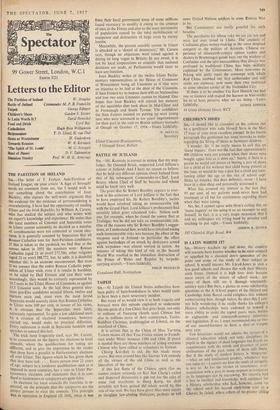Letters to the Editor
The Partition of Ireland W. Douglas
Commander M. P. B. Francklin George Edinger Gordon S. Sower David Henschel Cyril Ray Hugh Ross Williamson T. 0. Lloyd, H. van Thal H. Underdown W. R. Kermack M. G. Scroggie D. V. Tahmankar Prof. W. H. G. Armytage
Battle of Jutland Taipeh
Children's Shoes Is Latin Worth It ? Food and Drink Catholicism Betjemanism Scots at Westminster Towards Reunion 'The Spirit of St. Louis' Rani of Jhansi
Stainless Stanley THE PARTITION OF IRELAND
SIR,—The letter of T. Fechan, Anti-Partition of Ireland League, on your article 'A Sign of Strength' needs no comment from me, but I would wish to say something about the contribution of Joan Buckley, who repeats the well-worn argument that the evidence for the existence of gerrymandering is Overwhelming. I have had the opportunity of reading Ulster and the Irish Republic, by William A. Carson, who has studied the subject and who writes with an expert's knowledge and experience. He states that the total numbers of Unionist and Separatist votes in Ulster cannot accurately be decided as a number of constituencies were not contested at recent elec- tions. It is generally assumed by Separatists that all Roman Catholics vote for Anti-Partition candidates. If this is taken as the yardstick we find that at the census taken in 1951 the numbers were: Roman Catholics (aged 21 or over) 273,566; other religions (aged 21 or over) 588,772, but, hc adds, it is doubtful whether thi. is an accurate measurement. But even if we assume that the entire Roman Catholic popu- lation of Ulster wish, even if it results in hardship, to be ruled by Dail Eireann and cast thcir votes accordingly, they would be correctly represented by 16.5 seats in the Ulster House of Commons as against 35.5 Unionist seats. At the last three general elec- tions pro-Eire candidates secured fifteen, twelve and thirteen scats and, since even the most fervid Separatist would scarcely claim that Roman Catholics in Ulster were 100 per cent. in favour of his views, it is obvious' that the Separatists were fairly accurately represented. To gain a few additional scats by a revision of electoral boundaries, however carried out, would make no practical difference. Every endeavour is made in Separatist booklets and speeches to conceal this fact.
The trick most frequently used, says Mr. Carson, is to concentrate on the figures for elections to local councils, where the qualifications for voting are different, and to give the impression to the reader that these have a parallel in Parliamentary elections all over Ulster. The figures which he has given show that they have not. . . . Every person over 21 years of age, subject to a residence qualification such as is imposed in most countries, has a vote in Ulster Par- liamentary elections, and statements that it is con- fined to landowners or ratepayers are quite false. In elections for local councils the franchise is re- stricted, on the principle that the ratepayers are the proper persons to elect the councils. This principle was in operation in England till 1946, when it was from their local government areas of some millions found necessary to modify it owing to the absence of men in the Forces and also to the mass movements of population caused by the total mobilisation of manpower and destruction of large areas by enemy bombs.
Meanwhile, the present sensible system in Ulster is attacked as a 'denial of democracy,' Mr. Carson says, though no objections were raised against it during its long vogue in Britain. In any event, it is not by local corporations or councils that national decisions are made, or Parliaments would cease to have any function.
Joan Buckley writes of the twelve Ulster Parlia- mentary representatives in the House of Commons at Westminster being all Unionists as if that were an injustice to be laid at the door of thc'Unionists. If Sinn Fciners try to impose their will on Nationalists and lose two seats Unionists cannot be blamed. One hopes that Joan Buckley will refresh her memory of the squabbles that took place in Mid-Ulster and in Fermanagh and South Tyrone. The candidates the Sinn Feiners insisted on putting up were young men who were sentenced to ten years' imprisonment for their part in the raid on British military barracks at Omagh on October 17, 1954.—Yours faithfully,
W. DOUGLAS
Secretary
-Ulster Unionist Headquarters, 3 Glengall Street, Belfast


































 Previous page
Previous page